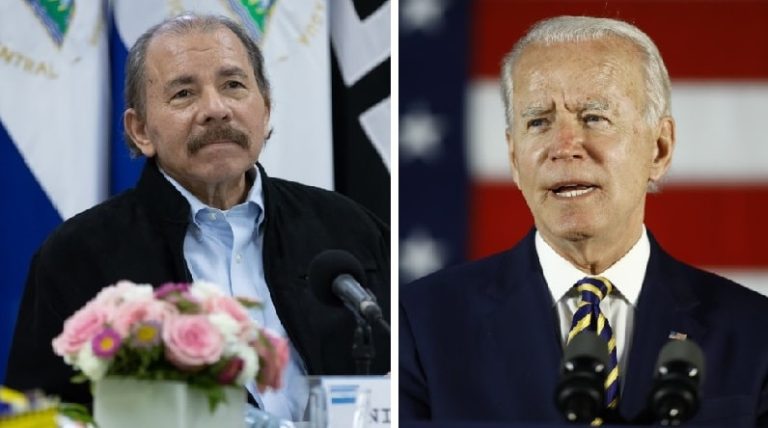23 de enero 2021

Children of Exile: The Births “Sowing Hope” in the Camp of Nicaraguan Farmers

PUBLICIDAD 1M
PUBLICIDAD 4D
PUBLICIDAD 5D
Daniel Ortega and Joe Biden Seasoned political scientist Richard Feinstein believes that under the Biden administration, sanctions against the Ortega

Según la VOA
The United States government is now in the hands of President Joe Biden and Vice President Kamala Harris. The new administration will undoubtedly be changing the approach towards sociopolitical and economic issues in other countries. Its policies towards regimes like that of Nicaragua, Venezuela and Cuba will likely be “not just threats and sanctions”. These are the predictions of political scientist, economist and former US government official Richard Feinberg.
Feinberg was interviewed during the Nicaraguan online news program “Esta Noche”. He noted that the Biden administration has already recognized that sanctions alone aren’t the answer. In the words of Anthony Blinken, the new US Secretary of State, the “sanctions (..) haven’t yielded results”.
In that context, Feinberg expects Biden’s policies toward Nicaragua to be “more realistic. Not just threats or sanctions but wrapped in realistic strategies. Also, they’ll be working with the European countries and other countries of the region. They could possibly enter into negotiations with the regime, and other active forces in the country.”
Feinberg is currently a professor at the University of California, San Diego. He stated that this possibility of addressing the situation in Nicaragua through negotiations would be aimed at the elections. The goal would be elections that are: “freer, with more possibilities for the opposition to organize and – above all – to unify.” They know, Feinberg added, that “in Nicaragua’s history, you can’t advance without unity.”
The political expert feels it’s possible to “create legal foundations for elections that open a democratic path.” This involves a joint effort. On the one hand, the strength of an organized population or opposition, and on the other, negotiations with international forces.
For the Ortega regime, Biden’s policy changes could be good news. The strategy of the Biden administration will probably be a combination of sanctions and incentives to negotiate. Feinberg noted, however, that “the people make their own history.”
Feinberg believes that Ortega must choose, as the Somoza dictatorship did, the road he wants to take. He must choose his response to these new policies oriented towards the search for democracy.
With Cuba, Feinberg predicted that Biden’s policies would be “more or less what Obama was doing.”
Judging by Biden’s campaign statements, Feinberg asserted, the next years will probably see a return to more open policies. He believes Biden will: “allow US citizens to visit Cuba, permit more flights, etc. In addition, Cubans living in the United States will be able to send their remittances to family members.”
However, Feinberg warned that the United States government would have to weigh “what happens on the island (…) [They’ll have to] find out if they decide to accept the reforms or not.”
In Feinberg’s opinion, the policies implemented by Obama yielded “a lot of results” in Cuba. This, he feels, was true, even though they only lasted two years.
Under those policies, “There was more freedom and more private businesses, a better climate towards the United States.” Feinberg deemed that if Biden invests in a “policy of openness towards the regime,” it may “offer better results”.
Biden’s approach to Latin America will be visible in the first hundred days of his government, said Feinberg. That’s despite the domestic challenges he faces in health, employment and the US economy.
“It’s a very large government, with a lot of people. It must be able to tackle a lot of things at the same time, internal affairs as well as external. So, I believe that we will have a Latin American policy within the first hundred days,” he affirmed.
Feinberg added that Biden’s team “is fully familiar with the region”. They’ll be able to work on “domestic problems” at the same time they “work with other countries, not in isolation”. “In addition to the pandemic, they must confront infrastructure problems, how to improve public education, problems of universal health care systems. (…) I believe that, yes, we’ll be able to share and work together with other countries, especially in Latin America.”
The economist commented that the work this new United States government has before it is “based on value chains*”. These would be implemented in Latin America, especially in Central America. The goals of these chains are: “more investment, more exports and more employment, especially in the free trade zones.”
Regarding Nicaragua’s access to this type of benefit, or agreements with the new U.S. government, Feinberg feels it’s uncertain. It would have to be seen, “if Nicaragua can enter on the road to democracy, once and for all (…) If so, then I haven’t the least doubt that Nicaragua could participate in those programs of regional aid.”
The Biden administration has already announced that they’ll be earmarking 4 billion dollars for Central America. The money will be aimed at combatting poverty and slowing emigration. However, only Honduras, El Salvador and Guatemala have been mentioned as beneficiary countries.
Up through December 2020, the US government had imposed sanctions on 27 top-level functionaries of the Ortega regime. Sanctions also affected nine public institutions or mixed enterprises. Among entities under sanction is the National Police.
*Value chains is a business concept, involving a set of activities that a company performs in order to deliver a valuable product to the market.
Archivado como:
PUBLICIDAD 3M
PUBLICIDAD 3D